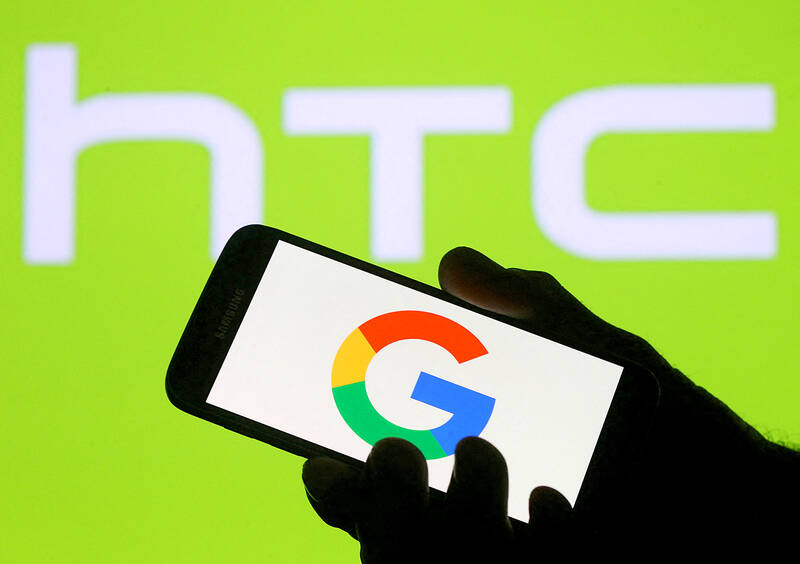HTC Corp (宏達電), which supplies VIVE virtual-reality (VR) headsets, yesterday said that Google LLC has agreed to buy its extended reality (XR) intellectual property (IP) and acquire some of its XR-related research and development (R&D) employees for US$250 million with an aim to expand its ecosystems of Android-based XR and smart glasses.
The agreement might be similar to a deal HTC clinched with Google in 2018. At the time, Google offered US$1.1 billion to acquire about 2,000 R&D workers, who helped create Google’s first Pixel phone, as well as access to IP owned by HTC.
The Taoyuan-based company yesterday declined to disclose the number of R&D workers involved in the XR-deal with Google.

Photo: Reuters
HTC believes it would still have sufficient R&D resources to develop new innovative products following the transaction, company spokesman Lu Chia-te (盧佳德) told a media briefing at the Taiwan Stock Exchange in Taipei.
Lu made the remarks in response to questions about whether HTC is capable of rolling out impressive products with a downsized R&D team, as the firm has substantially streamlined its smartphone business as a result of the disposal of the team in the Pixel deal.
At the end of March last year, HTC had hired 2,073 employees, with less than 2 percent holding a doctorate degree, the company’s annual report showed.
“This agreement reinforces HTC’s strategy of continued development around the XR ecosystem, enabling a more streamlined product portfolio with a focus on platforms, greater operational efficiency and financial flexibility,” Lu said.
“HTC’s commitment to deliver innovative VIVE XR solutions, such as the VIVE Focus Vision, remains unchanged, with existing product lines and solutions to be supported and developed without interruption,” he added.
The new deal with Google would grant the US technology giant non-exclusive access to HTC’s XR IP, meaning HTC would also have the right to utilize that IP to develop new XR devices, Lu said.
By utilizing HTC’s XR IP, Google would be able to accelerate the expansion of its Android-based VR headsets and smart glasses ecosystems, Lu said.
HTC would not rule out the possibility of exploring new partnerships with Google in the XR area, Lu said.
The companies are to wrap up the transaction this quarter, he said.
The company has been struggling to eke out a profit over the past six-and-half years. Losses widened to NT$2.6 billion (US$79.34 million) in the first three quarters of last year, compared with losses of NT$2.5 billion in the same period of 2023. That translated into losses of NT$3.12 per share, worsening from NT$3.01.

TECH CLUSTER: The US company’s new office is in the Shalun Smart Green Energy Science City, a new AI industry base and cybersecurity hub in southern Taiwan US chip designer Advanced Micro Devices Inc (AMD) yesterday launched an office in Tainan’s Gueiren District (歸仁), marking a significant milestone in the development of southern Taiwan’s artificial intelligence (AI) industry, the Tainan City Government said in a statement. AMD Taiwan general manager Vincent Chern (陳民皓) presided over the opening ceremony for the company’s new office at the Shalun Smart Green Energy Science City (沙崙智慧綠能科學城), a new AI industry base and cybersecurity hub in southern Taiwan. Facilities in the new office include an information processing center, and a research and development (R&D) center, the Tainan Economic Development Bureau said. The Ministry

ADVERSARIES: The new list includes 11 entities in China and one in Taiwan, which is a local branch of Chinese cloud computing firm Inspur Group The US added dozens of entities to a trade blacklist on Tuesday, the US Department of Commerce said, in part to disrupt Beijing’s artificial intelligence (AI) and advanced computing capabilities. The action affects 80 entities from countries including China, the United Arab Emirates and Iran, with the commerce department citing their “activities contrary to US national security and foreign policy.” Those added to the “entity list” are restricted from obtaining US items and technologies without government authorization. “We will not allow adversaries to exploit American technology to bolster their own militaries and threaten American lives,” US Secretary of Commerce Howard Lutnick said. The entities

Minister of Finance Chuang Tsui-yun (莊翠雲) yesterday told lawmakers that she “would not speculate,” but a “response plan” has been prepared in case Taiwan is targeted by US President Donald Trump’s reciprocal tariffs, which are to be announced on Wednesday next week. The Trump administration, including US Secretary of the Treasury Scott Bessent, has said that much of the proposed reciprocal tariffs would focus on the 15 countries that have the highest trade surpluses with the US. Bessent has referred to those countries as the “dirty 15,” but has not named them. Last year, Taiwan’s US$73.9 billion trade surplus with the US

The Taipei International Cycle Show (Taipei Cycle) yesterday opened at the Taipei Nangang Exhibition Center, with the event’s organizer expecting a steady recovery in the industry this year following a tough last year. This year, 980 companies from 35 countries are participating in the annual bicycle trade show, showcasing technological breakthroughs and market development trends of the bicycle industry at 3,600 booths, the Taiwan External Trade Development Council (TAITRA, 外貿協會) said in a statement. Under the theme “Ride the Revolution,” the exhibition has attracted more than 3,500 international buyers from 80 countries to preregister for the four-day event, which is expected to